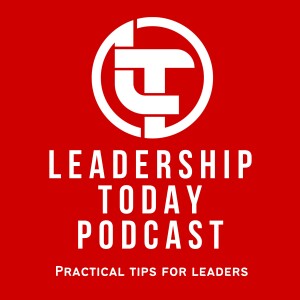
Leadership Today - Practical Tips For Leaders
Business:Management

Summary
With a fluid employment market it can be tempting to keep looking for new opportunities. This week we explore why you might need to stop looking for your next job.
Transcript
Welcome to episode 180 of the Leadership Today podcast where each week we bring research to life in your leadership. With a fluid employment market it can be tempting to keep looking for new opportunities. This week we explore why you might need to stop looking for your next job.
We all have times in our career when we want to make a change of job or organisation. We might be dissatisfied with our current role, be chasing a higher salary, or just want to make a change. We can then end up committing a lot of time and energy to looking around for new opportunities. If we’re going to go down the path of looking externally for a new role, we need to make sure the effort is well placed and worth it. The search for a new role can lead us to be less engaged and effective in our current role. Frustrations will likely become even more pronounced and noticeable. So here are some things to consider before you look for that next job:
- Focus on going rather than leaving. It’s far better to be motivated to go towards something you want to do, rather than have your decision driven by a desire to escape where you are. The grass often isn’t greener on the other side, and we can sometimes make poor decisions in order to get away from a situation. What feels like an awesome move can suddenly feel less great two months in.
- Explore internal options. Be open with your manager about what’s working and not working with your current role. Look for opportunities to add value to the organisation. If your interests align with organisational needs, it’s likely that a job can be crafted towards these needs. Talk to others about opportunities that might exist within the organisation. We often underestimate an organisation’s willingness to adapt or even create a job to keep a great employee.
- Make a decision to start or stop searching. It’s easy to start half-heartedly looking around without fully committing to a job search. That just extends the uncertainty of a job change which typically doesn’t help us. If you’re not convinced it’s time to leave, set a date in the future when you will reassess that decision. If you have decided to leave, set aside time each week to dedicate to that job search. As humans we crave certainty, so provide yourself that certainty by making a decision.
- Write a list of opportunities you would love to have in the future. You might want to work overseas, or manage a team, or work in a particular industry. Having this list clear in your head will help you to quickly act on opportunities that might come up unexpectedly. Most people’s careers are filled with chance encounters and opportunities, so be clear about what you want.
I hope these ideas are helpful. Having a fulfilling career is in your hands, but can also be elusive at times. Take time to reflect occasionally and make progress, but don’t obsess about that next job and miss the opportunities in front of you. Have a great week.
More Episodes
 2020-07-03
2020-07-03
 2020-06-05
2020-06-05
 2020-05-04
2020-05-04
 2020-05-01
2020-05-01
 2020-04-28
2020-04-28
 2020-04-24
2020-04-24
Create your
podcast in
minutes
- Full-featured podcast site
- Unlimited storage and bandwidth
- Comprehensive podcast stats
- Distribute to Apple Podcasts, Spotify, and more
- Make money with your podcast
It is Free
- Privacy Policy
- Cookie Policy
- Terms of Use
- Consent Preferences
- Copyright © 2015-2024 Podbean.com





